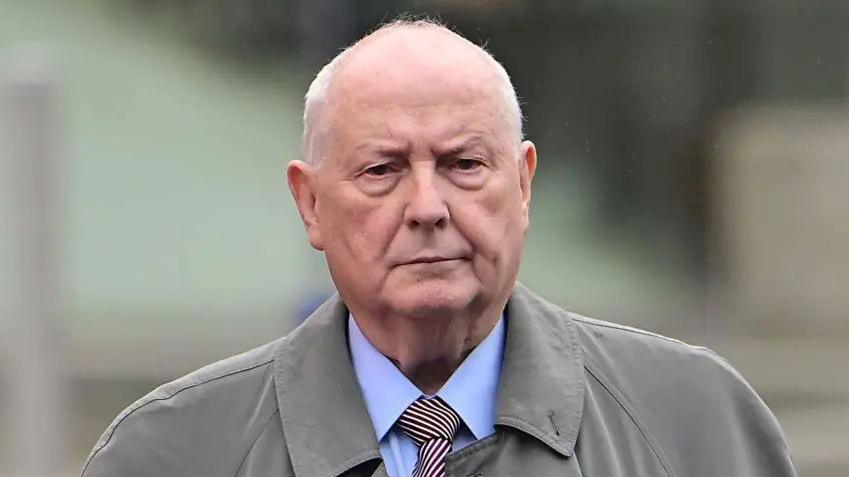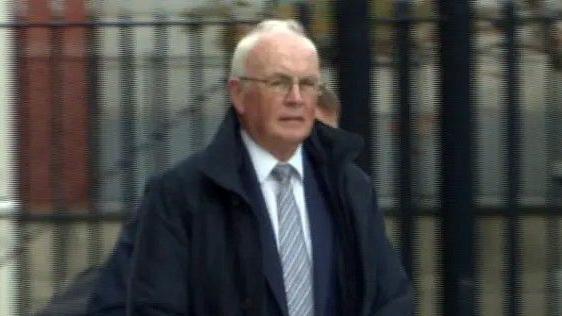Nama fraud accused was 'at the heart of Northern Irish government'

Mr Cushnahan, photographed outside court on 1 October, denies two fraud charges
- Published
The jury in the trial of two prominent businessmen facing fraud charges over a £1.1bn property deal have been told that one of them, Frank Cushnahan, was "at the heart of the Northern Ireland government".
It is alleged Mr Cushnahan, who was an adviser to the National Asset Management Agency (Nama), failed to declare an interest with a potential buyer in the run-up to the property deal, in spite of a legal obligation to do so.
The 83-year-old, of Alexandra Gate, Holywood, denies two fraud charges.
Ian Coulter, 54, of Templepatrick Road, Ballyclare, denies five charges, including fraud and transferring criminal property.

Ian Coulter, pictured outside court in September, denies the charges
The former chair of Nama, Frank Daly, was cross-examined by Mr Cushnahan's defence barrister Frank O'Donoghue KC.
Mr Daly was questioned about whether or not he knew about Mr Cushnahan's role as a corporate financier or his links to the Office of the First and Deputy First Minister (OFMDFM).
Mr O'Donoghue asked if it was known that Mr Cushnahan was "at the very heart of Northern Irish government".
Mr Daly said that whilst he was not aware of this when Mr Cushnahan's name was proposed, he "very quickly became aware afterwards".
"I don't disagree with you, he was at the heart of the Northern Ireland government, as you say"," he added.
Mr O'Donoghue told the court Mr Cushnahan had interests and relationships with business and banking communities.
He said "all this was known to Nama and Mr Cushnahan didn't try to hide it".
Mr Daly replied: "Yes that's fair to say. That's correct."

Frank Daly, pictured outside court on 8 October, was Nama's former chair
He was asked by Mr O'Donoghue about the members who were proposed to sit on the Northern Ireland Advisory Committee (NIAC) of Nama.
Mr Daly confirmed that the then Minister for Finance, Sammy Wilson, proposed the names of two men from Northern Ireland - civil servant Richard Pengelly and Neil Adair, who at the time was a Nama debtor.
Mr Daly said these two "original names were rejected" - Mr Adair because Nama realised he was a debtor and considered it inappropriate; Mr Pengelly because he was a civil servant in the Northern Ireland Executive and the Department of Finance saw that as inappropriate.
Following his decision, the names of Frank Cushnahan and Brian Rowntree were proposed as external members
Mr Daly then confirmed that whilst Mr Cushnahan's name was proposed by Sammy Wilson, it was his "understanding" that Mr Rowntree's proposal came from Martin McAleese, who at that time was the husband of Irish President Mary McAleese.
The purpose of Nama was to take over billions of property development debts held by banks in the Republic of Ireland.
The Northern Ireland loan book involved loans bundled together into an enormous portfolio.
The debts, which were worth about £4bn, were eventually sold to a US investment fund in 2014 for £1.1bn.
What is Nama?
Nama is the Republic of Ireland's "bad bank", set up by the Irish government in 2009 in the wake of the financial crisis which broke out the previous year.
Nama's role was to offload non-performing loans acquired from troubled banks.
Mr Cushnahan and Mr Coulter are both charged with fraud by false representation on or around 3 April 2014.
Mr Coulter faces a further four charges including transferring criminal property, namely money, between 15 September and 1 December 2014.
Between 1 April 2013 and 7 November 2013, Mr Cushnahan is accused of dishonestly failing to disclose information, that he was under a legal obligation to disclose to the Northern Ireland advisory committee and Nama.
He is accused of failing to inform them that he was providing information to a firm called Pimco over the proposed purchase of the Northern Ireland loan book from Nama.
It is alleged his intention was to make a gain for himself or someone else.
Both men deny all of the charges against them.
The trial continues.